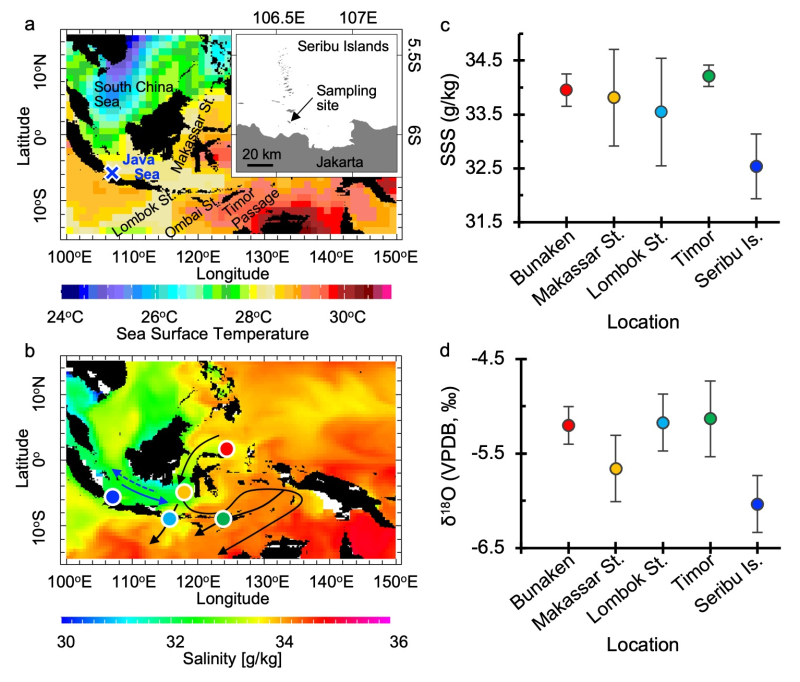
Unique behavior of marine conditions in the Java Sea reconstructed from a 70 yr coral δ18O and Sr/Ca record from the Seribu Islands, Indonesia
ABSTRACT

The Indonesian Throughflow (ITF) plays an important role in the heat flux and water budget between the Pacific and Indian oceans and may modulate climate variability. During the boreal winter monsoon, low-salinity, buoyant water carried from the Java Sea to the Southern Makassar Strait retards the sea-surface transport of the ITF, which may affect the Asian monsoon and climate change. However, observation records are inadequate to elucidate the marine environment around the Indonesian Seas. We analyzed coral Sr/Ca and δ18O from the Seribu Islands, Java Sea, and reconstructed sea-surface temperature (SST) and sea-surface salinity (SSS) for 1931–2002. The SST data indicate abrupt warming in the mid-1950s and, almost simultaneously, a rapid SSS shift to saline conditions. The relationships between SST around the Seribu Islands and climate variability in the Pacific and Indian oceans have changed after this abrupt warming events. Before the mid-1950s, during September to November, SST varied with the Indian Ocean Dipole, whereas El Niño–Southern Oscillation also affected SST variation after the mid-1950s. This abrupt change seems to be related to a regime shift in the tropical Pacific and Indian oceans, but there are no clear changes corresponding to other regime shifts such as that of 1970s. SSS variation exhibits no relationship with climatic factors, indicating that the dominant controlling factors of SST and SSS should be considered separately. Marine conditions in the Java Sea that affect the ITF show unique behavior, and further local studies in the Indonesian Seas are crucial to understand ITF behavior.
KEYWORDS
Coral, Geochemical tracers, Sea surface temperature, Salinity, Java SeaSupplementary Materials(file)
https://www.jstage.jst.go.jp/article/geochemj/56/3/56_GJ22007/_supplement/_download/56_GJ22007_1.pdf
- Published : 2022
- Released on J-STAGE : 2022/06/28
- Received : 2021/12/03
- Accepted : 2022/05/20
- DOI : https://doi.org/10.2343/geochemj.GJ22007
- J-STAGE URL : https://www.jstage.jst.go.jp/article/geochemj/56/3/56_GJ22007/_article/-char/ja
- J-Online ISSN: 1880-5973
- Print ISSN : 0016-7002
- ISSN-L : 0016-7002
All Issues
- Vol.60, 2026
- Vol.59, 2025
- Vol.58, 2024
- Vol.57, 2023
- Vol.56, 2022
- Vol.55, 2021
- Vol.54, 2020
- Vol.53, 2019
- Vol.52, 2018
- Vol.51, 2017
- Vol.50, 2016
- Vol.49, 2015
- Vol.48, 2014
- Vol.47, 2013
- Vol.46, 2012
- Vol.45, 2011
- Vol.44, 2010
- Vol.43, 2009
- Vol.42, 2008
- Vol.41, 2007
- Vol.40, 2006
- Vol.39, 2005
- Vol.38, 2004
- Vol.37, 2003
- Vol.36, 2002
- Vol.35, 2001
- Vol.34, 2000
- Vol.33, 1999
- Vol.32, 1998
- Vol.31, 1997
- Vol.30, 1996
- Vol.29, 1995
- Vol.28, 1994
- Vol.27, 1993
- Vol.26, 1992
- Vol.25, 1991
- Vol.24, 1990
- Vol.23, 1989
- Vol.22, 1988
- Vol.21, 1987
- Vol.20, 1986
- Vol.19, 1985-1986
- Vol.18, 1984
- Vol.17, 1983
- Vol.16, 1982
- Vol.15, 1981
- Vol.14, 1980
- Vol.13, 1979
- Vol.12, 1978
- Vol.11, 1977
- Vol.10, 1976
- Vol.9, 1975
- Vol.8, 1974
- Vol.7, 1973
- Vol.6, 1972-1973
- Vol.5, 1971
- Vol.4, 1970-1971
- Vol.3, 1969-1970
- Vol.2, 1968
- Vol.1, 1966-1967




